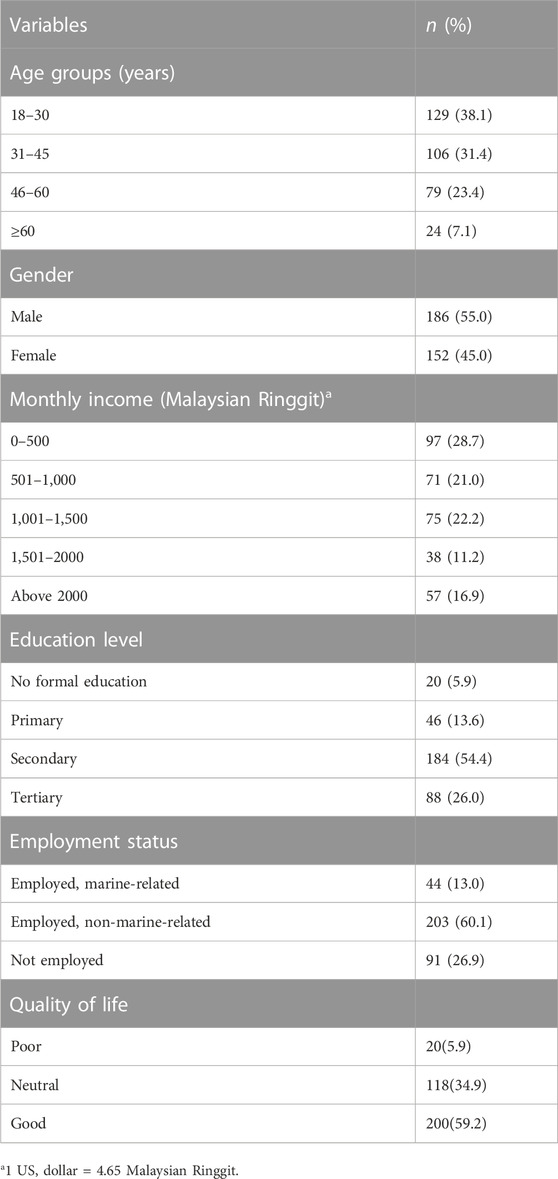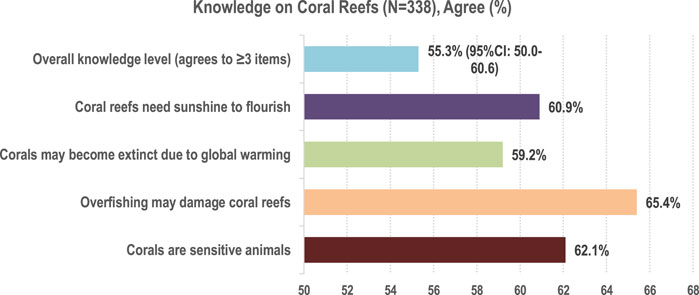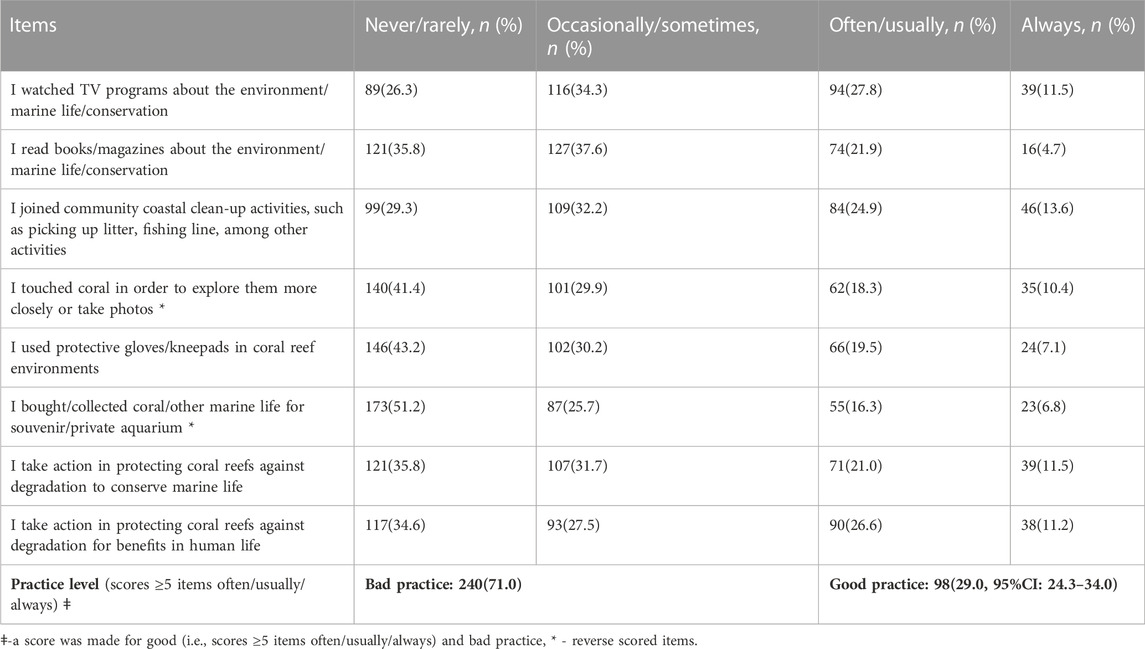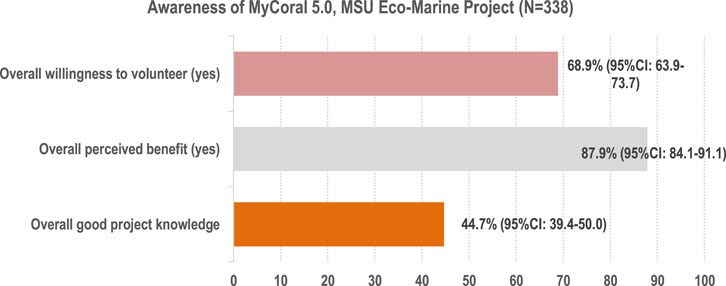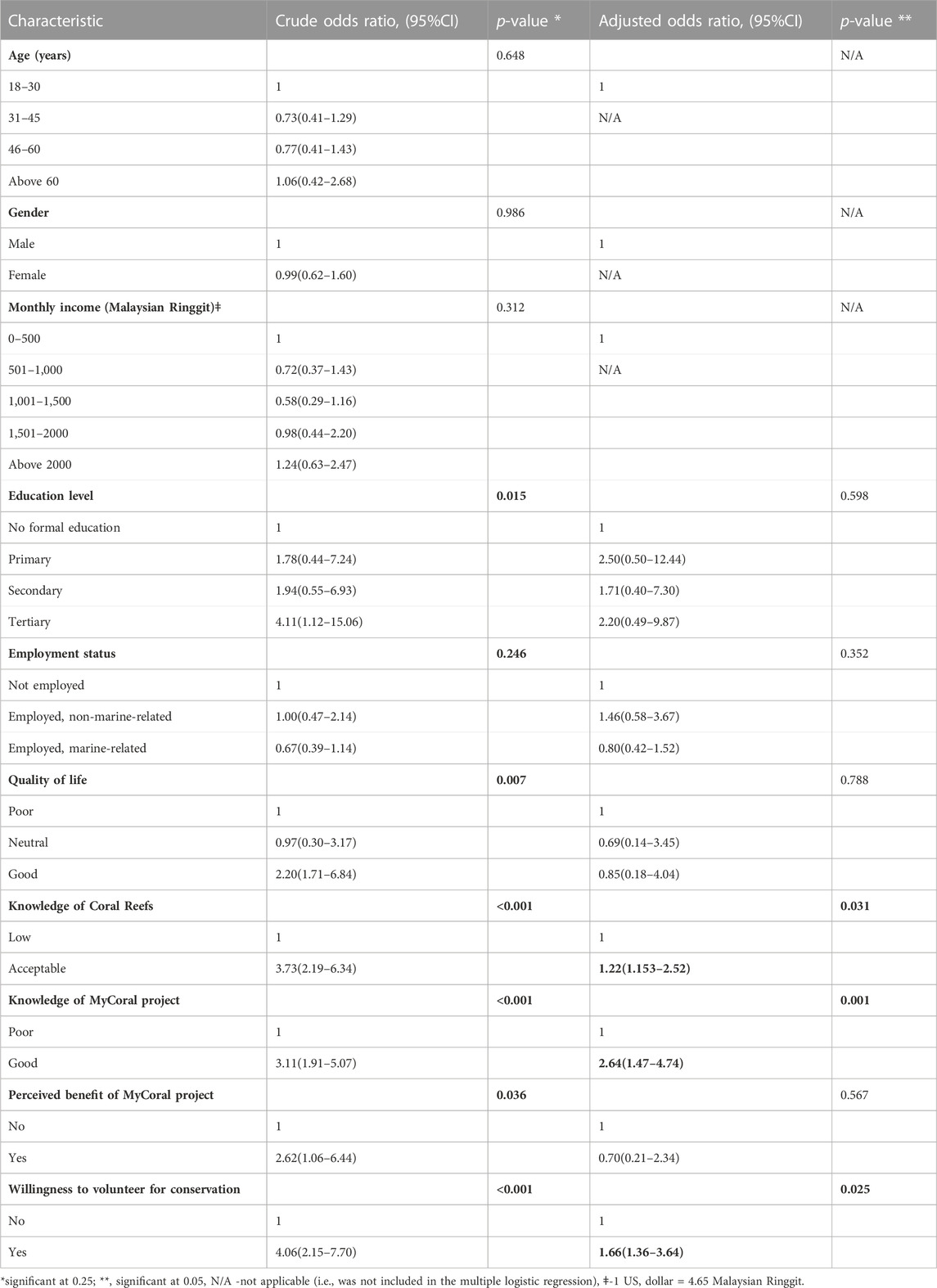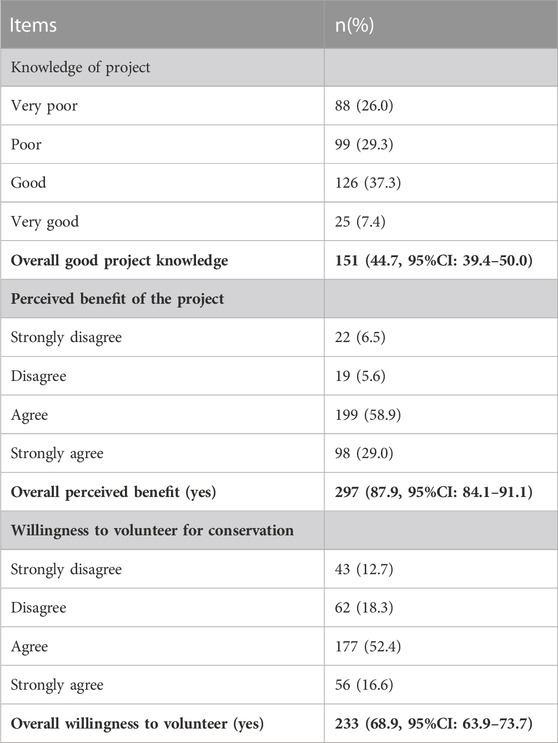- 1International Medical School, Management and Science University, Shah Alam, Selangor, Malaysia
- 2Centre for Health Behaviours Research, Jockey Club School of Public Health and Primary Care, Faculty of Medicine, The Chinese University of Hong Kong, Shatin, Hong Kong SAR, China
- 3Faculty of Health Sciences, Universiti Teknologi MARA Cawangan Pulau Pinang, Kampus Bertam, Penang, Malaysia
- 4Department of Health Administration, College of Business Administration, King Saud University, Riyadh, Saudi Arabia
Background: Malaysia’s coral reefs, primarily threatened by overfishing, pollution, and climate change, face significant challenges despite conservation efforts. Researchers from Management and Science University have taken a holistic approach towards coral reef conservation. This multi-stakeholder strategy, which involves local communities, government agencies, and private sectors, underscores the importance of collective action. A notable initiative within this approach is the coral transplantation program on Geluk Island, aiming to restore and bolster these crucial marine ecosystems.
Objective: This study aimed to investigate the knowledge, attitudes, and practices of the Terengganu community towards coral reef conservation and identify sociodemographic variables associated with community member practices.
Methodology: This was a cross-sectional study conducted from July to October 2022 in Setiu, Terengganu and recruited 338 adult local villagers. Data on participants’ sociodemographic characteristics, knowledge of coral reefs, awareness and attitude towards the MYCoral 5.0 MSU Eco-Marine Project, and practice of coral reef conservation were collected via validated interviewer-rated questionnaires. Logistic regression analysis was conducted to identify factors associated with good coral reef conservation practices, using SPSS version 2.
Results: Out of the 338 participants, 55.3% had acceptable knowledge on coral reefs, 29.0% had good practice of coral reef conservation. Additionally, 44.7% had good knowledge of the MyCoral 5.0 project, and 68.9% were willing to volunteer for coral reef conservation. Knowledge of coral reefs (AOR = 1.22, 95% CI: 1.15–2.52), knowledge of MyCoral project (AOR = 2.64, 95% CI: 1.47–4.74), and willingness to volunteer for conservation (AOR = 1.66, 95% CI: 1.36–3.64) were significantly associated with good practice of coral reef conservation.
Conclusion: The study results highlight a need for education and awareness programs to improve the knowledge and practices of coral reef conservation. Moreover, consideration of socio-demographic dynamics of the local communities in designing targeted conservation strategies could also be vital.
1 Introduction
Terengganu is a state on the eastern coast of Peninsular Malaysia and is renowned for its marine biodiversity and coral reefs. Coral reefs are diverse and important ecosystems, providing habitat to a quarter of all marine species and providing economic and social benefits to an estimated 850 million people in coastal communities worldwide (Coral Reef Rescue, 2023). However, coral reefs are declining at unprecedented rates globally due to climate change, ocean acidification, and overfishing. According to the World Wide Fund for Nature, half of the world’s coral reefs have been lost since 1980, and nine-tenths are at risk of being lost in the next few decades (Coral Reef Rescue, 2023). Notably, half of the world’s coral reefs are at risk from global warming. However, there is no quantitative data regarding the impacts of human activities, demographic, and climate change on coral reef ecosystems. Concernedly, Southeast Asia is losing coral reefs if these threats are not mitigated (Rosenberg et al., 2007; McLeod et al., 2010; Hughes et al., 2017).
Similarly, several studies and reports highlighted coral reef status and the impacts of declining coral reefs in Malaysia. Though statistics are scarce, the Marine Parks Department of Malaysia revealed that approximately four-tenth of the country’s coral reefs have been damaged or destroyed, with the east coast states being the most affected (Md Amin et al., 2020). In addition, a study conducted in Terengganu’s Redang Marine Park found that overfishing and pollution were the main drivers of coral reef decline and reduced species diversity (Saeed et al., 2021). These alarming statistics threaten the marine ecosystem and local communities that rely on coral reefs for food and income. Hence, highlight the urgent need for national and global coral reef conservation efforts. Multi-sectoral and multilevel collaboration is crucial to develop strategies to restore damaged and degraded reefs, conserve and protect the remaining reefs, and to ensure the survival of these important ecosystems for future generations.
In Malaysia, coral reef conservation efforts are led by local communities, governmental, and non-governmental organizations. These conservation measures include coral reef monitoring, assessment and management, research, legislation and enforcement, habitat restoration, public education campaigns, and outreach programs to raise awareness of coral reef conservation. Coral reefs of Malaysia are protected under the Environmental Quality Act (1974), Fisheries Act (1985), Pesticides Act (1974), Plant Quarantine Act (1976) and the Customs (Prohibition of Exports Amendment No. 4) Order (1993) (Praveena et al., 2012). The Malaysian government also established marine parks and protected areas. Currently, the Department of Marine Park Malaysia is managing 235,723 ha of marine protected areas, including Peninsular Malaysia islands and federal territories gazetted marine parks (Fourth National Report, 2023).
Notwithstanding these efforts, coral reefs in Malaysia still remain threatened. Overfishing, pollution, and climate change have depleted coral reefs and marine biodiversity in one of Terengganu Marine Park–Geluk Island (McLeod et al., 2010). This prompted the Malaysian government and various organizations’ conservation efforts to protect and restore reefs in Geluk Island and to promote sustainable use of the island’s resources. One common way for damaged reef restoration is coral transplantation, which helps to increase coral abundance, recruitment and species diversity. However, these are resource-intensive efforts and require strong political will, funding and public awareness.
Despite these challenges, a group of researchers from the Management and Science University (MSU) initiated a comprehensive, multi-stakeholder approach that involves local communities, government agencies, and private sectors to conserve coral reefs. In 2016, MSU in collaboration with the Department of Fisheries Malaysia and Dorken Reef Resources advocated a coral transplantation program–MyCoral MSU Eco-Marine Project at Geluk Island, to support the United Nations Sustainable Development Goals (SDGs)—Goal 14: Life Below Water. Since branching corals have one of the highest growth rates among other coral species, Acropora Formosa coral fragments were used in the study (Okubo and Omori, 2011). The study propagated coral by attaching coral fragments onto coral frames. In 2016–2018, a total of 31 coral frames were deployed.
Lastly, to ensure the success in reefs conservation and restoration, a combination of increased awareness, local community participation and support is crucial. Therefore, it is essential to explore the knowledge, attitudes, and practices of the Terengganu community in Malaysia towards coral reef conservation. Community members’ knowledge of the importance of coral reefs, threats endangering reefs, and their role in supporting local livelihoods and economies can influence community support for conservation efforts. Similarly, attitudes towards coral reef conservation are related to the perceptions of the benefits and costs of conservation, sense of ownership and control over resources, trust and relationships with government agencies and other stakeholders. Likewise, community members’ practices, including fishing and tourism, can significantly impact coral reefs’ health. Community members involved in sustainable fishing and tourism practices are more likely to support conservation efforts, while those who engage in destructive practices may be less supportive (Tarrant et al., 2008; Antimova et al., 2012; Vining and Ebreo, 2023).
This study aims to delve into the knowledge, attitude, and practices of the Terengganu community in Malaysia concerning coral reef conservation. By analyzing the socio-demographic factors and their influence on conservation actions, the research seeks to enlighten policymakers about community attitudes and practices vital for marine ecosystem preservation. Specifically, the study explored these pivotal questions:
1. How do socio-demographic factors influence awareness and practices toward coral reef conservation?
2. How knowledgeable is the community about coral reef biology and the threats they face?
3. What percentage of the community regularly engages in beneficial coral reef conservation practices?
4. How many are aware of the MyCoral 5.0 project, and do they perceive its benefits positively?
5. What specific factors motivate an individual’s willingness to volunteer for coral reef conservation?
6. Which of these factors serve as the strongest predictors for effective coral reef conservation practices?
2 Methods
2.1 Study design and setting
This quantitative-based cross-sectional study was conducted from July to October 2022 in Setiu, Terengganu. Geluk Island is a little island, located in the South China Sea and is a part of Terengganu Marine Park (Md Amin et al., 2020). As Geluk Island is situated approximately 30 km away from the Penarik Beach, two local villages–Kampung Rhu 10 and Kampung Mangkuk, which are located across the Penarik Beach of Setiu, were chosen to be the study area. This study was approved by the Ethics Committee of Management and Science University-EA-L1-01-IMS-2023-06-0008.
2.2 Participants and sample size planning
This study recruited a convenience sample of 338 adult local villagers residing in Kampung Rhu 10 and Kampung Mangkuk. The sample size was calculated using the Raosoft online calculator and an additional 20% of non-response rate was included, giving rise to a final sample size of 452. A total of 371/452 (82.1%) participants took part in the survey. After excluding participants with incomplete data, 338 participants were included in the study analysis. Individuals aged 18 years and above, residing in Kampung Rhu 10 and Kampung Mangkuk, and mentally fit were included in the study.
2.3 Data collection and management
Survey data were collected via paper-based validated interviewer-rated questionnaires. A training was given to all the interviewers by the investigators of the study and informed consent was obtained prior to data collection. The paper survey allowed only one response per person. Double data entry, comparison of entries, and reconciliation of discrepancies were performed using Microsoft Excel before data cleaning. Data encryption was done to protect data confidentiality.
2.4 Measures
2.4.1 Questionnaire
The questionnaire was validated by a panel five public health researchers and an environmental conservationist. Bilingual researchers translated the English version of the questionnaire to Bahasa Melayu local language. The agreed version was back-translated into English by independent bilingual researchers to ensure linguistic equivalence. The questionnaire was then pilot-tested among 30 individuals from the target community to assess its clarity and appropriateness. From the pilot study, participants believed that the length was acceptable and the contents were easy to comprehend. These 30 participants did not participate in the actual survey. The panel finalized the questionnaire.
2.4.2 Background characteristics
Participants reported their sociodemographic characteristics including age, gender, education level, monthly income, marital status, employment status, and quality of life.
2.4.3 Knowledge of coral reefs
Knowledge on Coral Reefs was assessed by 4 questions. Participants were asked how much they agree to questions/statements like “Corals are sensitive animals”, “Overfishing may damage coral reefs”, “Corals may become extinct due to global warming” and “Coral reefs need sunshine to flourish”. The response options were classified as agree, neutral and disagree. A score was then made for acceptable/high knowledge (if one agreed to ≥3 items) and unacceptable/low knowledge if otherwise.
2.4.4 Awareness of and attitude towards the MYCoral 5.0 MSU Eco-Marine Project
Additionally, participants’ awareness of the MYCoral 5.0 MSU Eco-Marine Project was assessed by a single question “Do you know about the MyCoral 5.0, MSU Eco-Marine Project?” with response options of very poor, poor, good, and very good. Participants were also asked about the perceived benefits of the project and willingness to volunteer for coral reef conservation, both with 4 response options, range strongly disagree (Coral Reef Rescue, 2023) to strongly agree (Rosenberg et al., 2007).
2.4.5 Practice of practice of coral reef conservation
Participants were asked how often they practiced 8 activities related to conservation of coral reefs, with a 7 Likert scale response, range never (Coral Reef Rescue, 2023) to always (Okubo and Omori, 2011). These activities included: “I watched TV programs about the environment/marine life/conservation”, “I joined community coastal clean-up activities, such as picking up litter, fishing line, etc.,”, “I take action in protecting coral reefs against degradation to conserve marine life”, among others. A score was then made for good practice (if one scored ≥5 items often/usually/always) and bad practice if other wise.
2.5 Statistical analysis
Frequency distribution of all studied variables is presented. We then assessed the distribution of Participants’ willingness to volunteer for coral reef conservation across their sociodemographics, using the chi-square test. Univariable and multivariable logistic regression was conducted to assess for significant factors associated with good practice of coral reef conservation. Only variables significant at 0.25 in univariable analysis were included in the multivariable regression model. We presented the respective odds ratios (crude and adjusted), including their 95% confidence intervals and p-values. All the analysis was done using SPSS version 25.
3 Results
3.1 Socio-demographic profile of the respondents
The study consisted of 338 participants, of which the majority were male (55.0%), aged 18–45 years (69.3%), had secondary education (54.4%), and with monthly income not more than 1500 RM (71.9%). In addition, 60.1% employed in non-marine-related jobs and 59.2% reported good quality of life (Table 1).
3.2 Knowledge on coral reefs
Of the 338 participants, 187(55.3%, 95%CI: 50.0–60.6) had acceptable knowledge on coral reefs (Figure 1 and Appendix 1). Majority agreed that corals are sensitive animal (62.1%), overfishing may damage coral reefs (65.4%), coral reefs need sunshine to flourish (60.9%) and that corals may become extinct due to global warming (59.2%).
3.3 Practice of coral reef conservation
Of the 338 respondent, only 98(29.0%, 95%CI: 24.3–34.0) had good practice of coral reef conservation (Table 2). Majority of the participants rarely or occasionally practiced good coral reef conservation.
3.4 Awareness of MyCoral 5.0, MSU Eco-Marine Project
Assessment results for awareness of the MyCoral 5.0 project are detailed in Figure 2 and Appendix 2. Summatively, of the 338 participants, 151(44.7, 95%CI: 39.4–50.0) had good knowledge of the project, 297(87.9, 95%CI: 84.1–91.1) perceived the project as beneficial, and 233(68.9, 95%CI: 63.9–73.7) were willing to volunteer for coral reef conservation.
3.5 Distribution of participants’ willingness to volunteer for coral reef conservation
Participants’ willingness to volunteer for coral reef conservation significantly varied with monthly income, education level, quality of life, knowledge of coral reefs, practice of coral reef conservation, knowledge of MyCoral project, and perceived benefit of MyCoral project (Table 3).
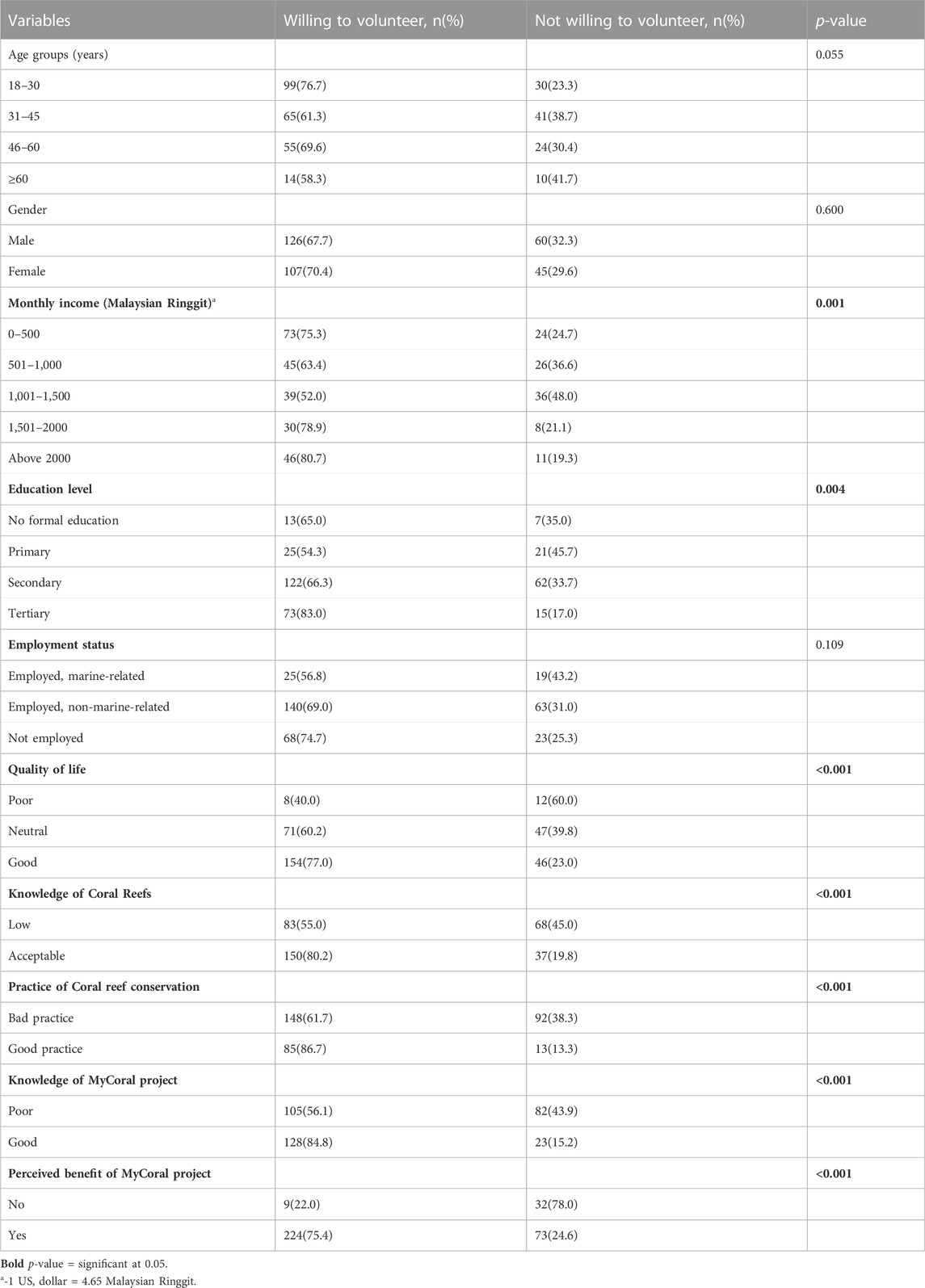
TABLE 3. Participants’ willingness to volunteer for coral reef conservation across socio-demographics (n = 338).
3.6 Factors associated with good practice of coral reef conservation
Results of bivariable analysis are detailed in Table 4, with significant factors independently associated with good practice of coral reef conservation highlighted. On multivariable logistic regression analysis, factors found with significant association were knowledge of coral reefs, knowledge of MyCoral project and willingness to volunteer for conservation (Table 4).
Compared to participants with low knowledge, those with acceptable knowledge of coral reefs (AOR = 1.22, 95%CI: 1.15–2.52) had higher odds of good practice of coral reef conservation, similar those with good knowledge of MyCoral project (AOR = 2.64, 95%CI: 1.47–4.74) compared to their counterparts with poor knowledge of the project. Moreover, participants willing to volunteer for coral reef conservation (AOR = 1.66, 95%CI: 1.36–3.64) also had higher odds of good practice of coral reef conservation, compared to those not willing to volunteer.
4 Discussion
4.1 Primary findings
This study aimed to examine the relationship between the socio-demographic profile of the Terengganu community and their knowledge, attitude, and practices (KAP) towards coral reef conservation in Malaysia. The KAP assessment results for knowledge among the Terengganu community revealed, around half of the total participants had acceptable knowledge of coral reefs. The majority agreed that corals are sensitive animals, overfishing may damage coral reefs, coral reefs need sunshine to flourish, and that corals may become extinct due to global warming. However, only a quarter had good practice in coral reef conservation with the majority of the participants rarely or occasionally practising good coral reef conservation. Generally, on assessment results for awareness of the MyCoral 5.0 project, around half of the study participants, had good knowledge of the project, more than two-fifths perceived the project as beneficial, and two-thirds were willing to volunteer for coral reef conservation.
Notably, the analysis revealed that participants’ willingness to volunteer for coral reef conservation significantly varied with socio-demographic characteristics, i.e., monthly income, education level, quality of life, knowledge of coral reefs, the practice of coral reef conservation, knowledge of MyCoral project, and perceived benefit of MyCoral project. These findings are consistent with study of Saeed BQ et al., who found that socio-demographic characteristics, such as age, gender, level of education, and employment, were significantly related to a higher mean score of knowledge and practice (p < 0.05) (Saeed et al., 2021). Similarly, the study by Habibi M et al., also supported the same (Habibi et al., 2018). Further, the study by Arbiol et al., who theorized that good practice would be significantly connected with socio-demographic characteristics, knowledge, and attitude, consolidates our results (Arbiol et al., 2016).
The study results also revealed factors found with significant association with good practice of coral reef conservation which included knowledge of coral reefs, knowledge of the MyCoral project, and willingness to volunteer for conservation. Compared to participants with low knowledge, those with acceptable knowledge of coral reefs had higher odds of good practice of coral reef conservation, similar to those with good knowledge of the MyCoral project compared to their counterparts with poor knowledge of the project. Moreover, participants willing to volunteer for coral reef conservation also had higher odds of good practice of coral reef conservation, compared to those not willing to volunteer. The findings above suspect a plausible relation between knowledge, attitude, and good practice. Based on existing literature, some studies have found no relationship between environmental knowledge and attitude (Tarrant et al., 2008), while others have argued that environmental knowledge is a necessary precursor to environmental attitude (Antimova et al., 2012). Vining et al., suggested that there is a moderate relationship between environmental knowledge, attitude, and practice, which means that there is some correlation between these three factors (Vining and Ebreo, 2023). However, the nature and strength of this relationship are still a topic of ongoing research and discussion. Despite numerous studies, there is a conflicting view on the relationship between pro-environmental attitude and practice, with studies proving that an association predominates (Fransson and Gärling, 1999; Thapa, 2010; Cottrrel, 2016; Schultz et al., 2016; Tang et al., 2022). A further understanding of the impact of socio-demographic characteristics, knowledge, and attitudes towards coral reef conservation will assist the policymakers to create strategies for conserving coral reefs on targeted factors considering the root cause of coral reef decline in the state.
4.2 Implications
The findings of this study indicate the willingness to volunteer for coral reef conservation varies with socio-demographic characteristics and has implications for conservation efforts aimed at preserving coral reefs. This implies that to effectively engage individuals in conservation efforts, organizations need to take into account the demographic dynamics of local communities. For instance, targeting conservation education and awareness campaigns to individuals with a higher level of education or income may be more effective in promoting volunteerism. Additionally, promoting the perceived benefits of conservation efforts to individuals can increase their willingness to participate. This information can help conservation organizations better target and tailor their programs to increase participation and achieve better outcomes for coral reef conservation.
The significant association of sociodemographic factors with good practice of coral reef conservation has implications for conservation organizations. The findings suggest that knowledge and willingness to volunteer are key factors in promoting good conservation practices. Participants who have a good understanding of coral reefs and the MyCoral project and are willing to volunteer, are more likely to engage in good conservation practices. This highlights the need for conservation organizations to focus on educating individuals and increasing their awareness of the importance of coral reefs and the impact they have on the environment. By promoting knowledge and volunteerism, organizations can increase the number of individuals who engage in good conservation practices and ultimately contribute to the preservation of coral reefs.
Overall, it is important to engage the Terengganu community in coral reef conservation efforts, raise their awareness and understanding of the importance of these ecosystems, and provide them with incentives and benefits for supporting conservation. This can help to build community support for conservation and promote more sustainable practices that can help to protect and restore the coral reefs in Terengganu and the surrounding region.
4.3 Recommendations
It becomes imperative for stakeholders to implement a multi-pronged approach to coral reef conservation:
Short-Term Measures: Immediate efforts should focus on intensive awareness campaigns in Terengganu communities, emphasizing the importance of coral reefs and dispelling myths. These campaigns could take the form of community seminars, school outreach programs, and multimedia promotions. Simultaneously, organize hands-on training sessions on coral reef conservation practices for interested individuals, which can foster better engagement and understanding.
Medium-Term Measures: Based on our study’s observation regarding the association of socio-demographic factors with conservation practices, targeted educational programs for different demographic groups should be initiated. Partnerships with local schools and colleges can be built to integrate coral conservation modules into their curriculum. Additionally, initiate local volunteer programs where individuals can participate in real-time coral conservation activities, giving them first-hand experience and fostering a sense of responsibility.
Long-Term Measures: For the long haul, engage in continuous community feedback to refine and upgrade conservation programs. Create a platform for Terengganu residents to voice their suggestions and concerns about coral conservation, ensuring a two-way dialogue. Establish mentorship programs where individuals well-versed in conservation practices guide newcomers. Lastly, collaborate with international conservation agencies to bring global best practices to Terengganu, ensuring that the community’s efforts are aligned with global standards.
4.4 Limitations and future studies
The limitations of this survey in determining factors associated with community participation in coral reef conservation may include; response bias: as it is based on self-reported data, which can be influenced by social desirability bias or recall bias. The representativeness of the sample used in the survey could affect the validity of the results as the study did not include the elderly. Moreover, given the cross-sectional design, the study could not accurately reflect changes over time or the dynamics of the community, and causal evidence cannot be established.
To overcome the limitations of self-reported data, future studies should consider using multiple data sources, such as direct observation, to validate the results of KAP surveys. Future studies should consider the whole system of factors that influence community participation in conservation efforts, such as access to resources, and political context. Moreover, to improve the study validity, future studies should consider more robust designs like longitudinal designs and methods like stratified or multi-stage sampling to ensure sample representativeness.
5 Conclusion
This study examined the knowledge, attitude, and practices of the Terengganu community towards coral reef conservation in Malaysia. The study highlights the need for further education and awareness programs to improve the knowledge and practices of the community towards coral reef conservation. Socio-demographic characteristics such as income, education level, and quality of life must be considered in the design of effective conservation strategies. The findings suggest a plausible relationship between knowledge, attitude, and good practice, although further investigation is required. The study adds to the growing body of literature on coral reef conservation and provides valuable insights for policymakers and conservationists to create targeted conservation strategies that take into account the socio-demographic factors of the local communities.
Data availability statement
The original contributions presented in the study are included in the article/Supplementary Materials, further inquiries can be directed to the corresponding authors.
Ethics statement
The studies involving humans were approved by the Ethics Committee of Management and Science University. The studies were conducted in accordance with the local legislation and institutional requirements. The participants provided their written informed consent to participate in this study.
Author contributions
RM: Conceptualization, Data curation, Formal Analysis, Investigation, Methodology, Project administration, Resources, Software, Supervision, Validation, Visualization, Writing–original draft, Writing–review and editing. HC: Writing–original draft, Writing–review and editing. HA: Writing–original draft, Writing–review and editing. MKA: Writing–original draft, Writing–review and editing. MHN: Writing–original draft, Writing–review and editing. IA: Writing–original draft, Writing–review and editing. HH: Writing–original draft, Writing–review and editing. AA: Writing–original draft, Writing–review and editing. JK: Data curation, Formal Analysis, Writing–original draft, Writing–review and editing. SH: Writing–original draft, Writing–review and editing. MA: Writing–original draft, Writing–review and editing.
Funding
The author(s) declare that no financial support was received for the research, authorship, and/or publication of this article.
Acknowledgments
The authors of this study extend their appreciation to the Research Supporting Project, King Saud University, Saudi Arabia, for supporting this study (RSP-2023R481).
Conflict of interest
The authors declare that the research was conducted in the absence of any commercial or financial relationships that could be construed as a potential conflict of interest.
Publisher’s note
All claims expressed in this article are solely those of the authors and do not necessarily represent those of their affiliated organizations, or those of the publisher, the editors and the reviewers. Any product that may be evaluated in this article, or claim that may be made by its manufacturer, is not guaranteed or endorsed by the publisher.
References
Antimova, R., Nawijn, J., and Peeters, P. (2012). The awareness/attitude-gap in sustainable tourism: A theoretical perspective. Tour. Rev. 67 (3), 7–16. doi:10.1108/16605371211259795
Arbiol, J., Orencio, P. M., Romena, N., Nomura, H., Takahashi, Y., and Yabe, M. (2016). Knowledge, attitude and practices towards leptospirosis among lakeshore communities of calamba and los baños, laguna, Philippines. Agric 6 (2), 18. doi:10.3390/agriculture6020018
Coral Reef Rescue (2023). Coral reef Rescue | WWF. Available from: https://wwf.panda.org/discover/our_focus/oceans_practice/coral_reef_rescue/(Accessed February 2, 2023).
Cottrrel, S. P. (2016). Influence of sociodemographics and environmental attitudes on general responsible environmental behavior among recreational boaters. Environ. Behav. 35 (3), 347–375. doi:10.1177/0013916503035003003
Fourth National Report (2023). Fourth national report. https://www.cbd.int/nr4/disabled-default.shtml (Accessed February 5, 2023).
Fransson, N., and Gärling, T. (1999). Environmental concern: Conceptual definitions, measurement methods, and research findings. J. Environ. Psychol. 19 (4), 369–382. doi:10.1006/jevp.1999.0141
Habibi, M., Laamiri, F. Z., Aguenaou, H., Doukkali, L., Mrabet, M., and Barkat, A. (2018). The impact of maternal socio-demographic characteristics on breastfeeding knowledge and practices: An experience from Casablanca, Morocco. Int. J. Pediatr. Adolesc. Med. 5 (2), 39–48. doi:10.1016/j.ijpam.2018.01.003
Hughes, T. P., Kerry, J. T., Álvarez-Noriega, M., Álvarez-Romero, J. G., Anderson, K. D., Baird, A. H., et al. (2017). Global warming and recurrent mass bleaching of corals. Nature 543 (7645), 373–377. doi:10.1038/nature21707
McLeod, E., Moffitt, R., Timmermann, A., Salm, R., Menviel, L., Palmer, M. J., et al. (2010). Warming seas in the coral triangle: Coral reef vulnerability and management implications. Coast. Manag. 38 (5), 518–539. doi:10.1080/08920753.2010.509466
Md Amin, R., Sohaimi, E. S., Anuar, S. T., and Bachok, Z. (2020). Microplastic ingestion by zooplankton in Terengganu coastal waters, southern South China Sea. Mar. Pollut. Bull. 150, 110616. doi:10.1016/j.marpolbul.2019.110616
Okubo, N., and Omori, M. (2011). The review of coral transplantation around the world. J. Jpn. Coral Reef. Soc. 2001 (3), 31–40. doi:10.3755/jcrs.2001.31
Praveena, S. M., Siraj, S. S., and Aris, A. Z. (2012). Coral reefs studies and threats in Malaysia: A mini review. Rev. Environ. Sci. Bio/Technology 11 (1), 27–39. doi:10.1007/s11157-011-9261-8
Rosenberg, E., Koren, O., Reshef, L., Efrony, R., and Zilber-Rosenberg, I. (2007). The role of microorganisms in coral health, disease and evolution. Nat. Rev. Microbiol. 5 (5), 355–362. doi:10.1038/nrmicro1635
Saeed, B. Q., Al-Shahrabi, R., and Bolarinwa, O. A. (2021). Socio-demographic correlate of knowledge and practice toward COVID-19 among people living in mosul-Iraq: A cross-sectional study. PLoS One 16 (3), e0249310. doi:10.1371/journal.pone.0249310
Schultz, P. W., Gouveia, V. V., Cameron, L. D., Tankha, G., Schmuck, P., and Franěk, M. (2016). Values and their relationship to environmental concern and conservation behavior. J. Cross-Cultural Psychol. 36 (4), 457–475. doi:10.1177/0022022105275962
Tang, H., Ma, Y., and Ren, J. (2022). Influencing factors and mechanism of tourists’ pro-environmental behavior – empirical analysis of the CAC-MOA integration model. Front. Psychol. 13, 1060404. doi:10.3389/fpsyg.2022.1060404
Tarrant, M. A., Bright, A. D., and Cordell, H. K. (2008). Attitudes toward wildlife species protection: Assessing moderating and mediating effects in the value-attitude relationship. Hum. Dimensions Wildl. 2 (2), 1–20. doi:10.1080/10871209709359091
Thapa, B. (2010). The mediation effect of outdoor recreation participation on environmental attitude-behavior correspondence. J. Environ. Educ. 41 (3), 133–150. doi:10.1080/00958960903439989
Vining, J., and Ebreo, A. (2023). Emerging theoretical and methodological perspectives on conservation behavior. PsycNET. Available from: https://psycnet.apa.org/record/2002-02395-035 (Accessed February 5, 2023).
Appendix 1 Knowledge on coral reefs (n = 338).
Appendix 2 Awareness of MyCoral 5.0, MSU Eco-Marine Project (n = 338).
Keywords: sustainable development, knowledge, attitude, practice, coral reef conservation, resources
Citation: Marzo RR, Chen HWJ, Anuar H, Abdul Wahab MK, Nizam MH, Ariffin IA, Hamzah H, Ahmad AI, Kawuki J, Halim S and Aljuaid M (2023) Knowledge, attitude, and practice of coral reef conservation among Terengganu community of Malaysia. Front. Environ. Sci. 11:1267980. doi: 10.3389/fenvs.2023.1267980
Received: 28 July 2023; Accepted: 18 September 2023;
Published: 09 October 2023.
Edited by:
Tien Ming Lee, Sun Yat-sen University,Reviewed by:
Thadickal V. Joydas, King Fahd University of Petroleum and Minerals, Saudi ArabiaIlana Rosental Zalmon, State University of Northern Rio de Janeiro, Brazil
Copyright © 2023 Marzo, Chen, Anuar, Abdul Wahab, Nizam, Ariffin, Hamzah, Ahmad, Kawuki, Halim and Aljuaid. This is an open-access article distributed under the terms of the Creative Commons Attribution License (CC BY). The use, distribution or reproduction in other forums is permitted, provided the original author(s) and the copyright owner(s) are credited and that the original publication in this journal is cited, in accordance with accepted academic practice. No use, distribution or reproduction is permitted which does not comply with these terms.
*Correspondence: Roy Rillera Marzo, cnJtdGV4YXNAeWFob28uY29t; Mohammed Aljuaid, bWFsanVhaWRAa3N1LmVkdS5zYQ==
 Roy Rillera Marzo
Roy Rillera Marzo Hana W. Jun Chen
Hana W. Jun Chen Haryati Anuar1
Haryati Anuar1 Joseph Kawuki
Joseph Kawuki Mohammed Aljuaid
Mohammed Aljuaid